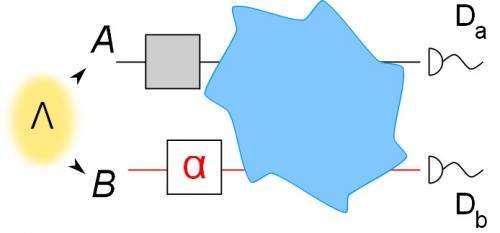February 23, 2015 feature
Could classical theory be just as weird as quantum theory?

Quantum mechanics is often described as "weird" and "strange" because it abandons many of the intuitive traits of classical physics. For example, the ideas that the world is objective, is deterministic, and exists independent of measurement are basic features of classical theory, but do not always hold up in quantum theory. But what if it turns out that these intuitive ideas are not true features of classical physics, either? Would classical theory be just as weird as quantum theory?
In a new study published in Physical Review Letters, physicists Radu Ionicioiu, et al., have shown that the three apparently reasonable classical assumptions mentioned above—objectivity, determinism, and independence—are mutually incompatible with any theory, not only with quantum mechanics. The scientists show that, while any two of the three assumptions are compatible, all three are not. All told, our seemingly reasonable classical assumptions may not be so reasonable after all.
"Sometimes classical ideas may seem 'natural' and 'logical' simply because we do not test them too strongly," coauthor Daniel Terno at Macquarie University in Sydney, Australia, told Phys.org. "Quantum mechanics may be weird, but our classical illusions may be weird too—or simply impossible to maintain, no matter how the world really operates."
The findings could have widespread implications. For many decades, physicists have assumed that our everyday classical ideas are consistent with each other, and have used them to investigate the tensions between the classical and quantum world views. Hidden variable theories, for example, attempt to complete or improve quantum mechanics by reproducing the results of quantum theory while incorporating these classical intuitions. If the new findings are correct, then they will demand that physicists question the basic tenets not only of quantum theory, but of classical theory, as well.
"Our take from this project [a warning: not a theorem, but an opinion] is that because the classical intuitions may be as weird as the quantum predictions, the entire motivation of the hidden variable program to explain quantum mechanics is somewhat pointless," Terno said. "There is no reason to exchange one type of weirdness for another, or to accept some and try to explain away the rest."
The uncovered incompatibility of the three assumptions centers on the quantum phenomenon of wave-particle duality. In their study, the physicists analyzed a version of the delayed-choice experiment, which demonstrates wave-particle duality with an interferometer. In this experiment, a photon behaves as a particle when the interferometer is open and as a wave when it is closed.
The experiment shows that, at any moment in time, a photon cannot be considered as either just a particle or just a wave, depending on the experimental set-up, but instead it has both properties. The experiment builds on the authors' previous work, in which they show how to simplify the demonstration of wave-particle duality.
In the new work, the researchers questioned the usual assumption that classical ideas, even if incompatible with quantum mechanics, are consistent. Here, objectivity is defined as a photon being either a particle or a wave, but not both. Determinism means that the outcome (whether the photon is a particle or a wave) can be determined if all information about the scenario, including any hidden variables, is known. Independence means that the outcome does not depend on the specific experimental setting.
Discover the latest in science, tech, and space with over 100,000 subscribers who rely on Phys.org for daily insights. Sign up for our free newsletter and get updates on breakthroughs, innovations, and research that matter—daily or weekly.
As the physicists explain, because the photon demonstrates both particle and wave behavior in the two different experimental setups, then trying to satisfy all three requirements makes it impossible to have any experimental result at all. As long as different experimental setups yield different types of behavior, then the three intuitive ideas are incompatible, no matter what kind of theory is used. Terno explains this idea using an analogy with an overly demanding client:
"Our result was built similarly to what an annoying client wants from a travel agent: 'I should have this and that, and here and there, but not such and such, and definitely not this way...,' and at the end, no itinerary can satisfy all of the client's constraints. Something has to give.
"When one imagines a hidden variable theory that describes the experiments we consider, it has only so much freedom (seven parameters, to be exact). Putting constraints that are mathematical expressions of our three intuitive requirements reduces the freedom until nothing is left."
Because any two of the three ideas are mutually compatible, the physicists suggest that it seems most natural to drop the objectivity assumption, while keeping determinism and independence. This choice requires that wave-particle duality be accepted, regardless of its counterintuitive nature. However, knowing for sure will be a subject of future research.
More information: adu Ionicioiu, Robert B. Mann, and Daniel R. Terno. "Determinism, Independence, and Objectivity are Incompatible." Physical Review Letters. DOI: 10.1103/PhysRevLett.114.060405
Journal information: Physical Review Letters
© 2015 Phys.org




















